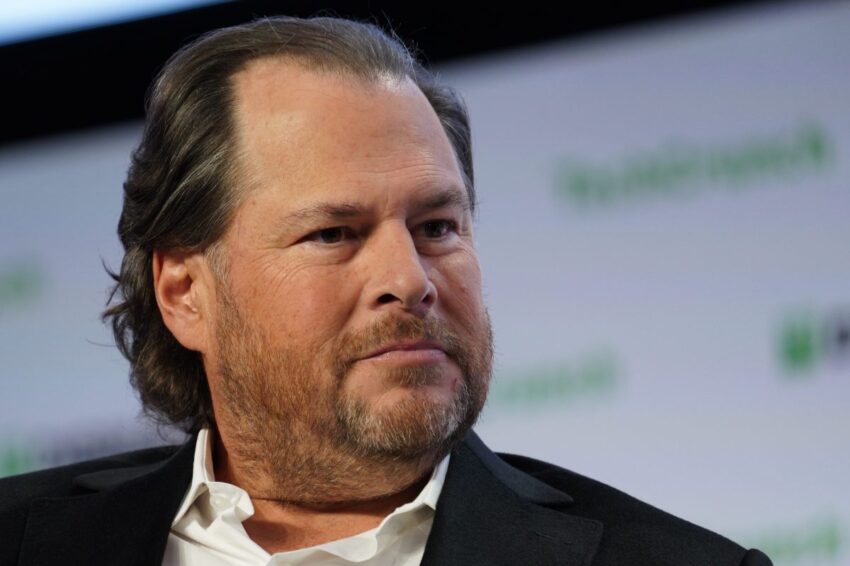
salesforce ceo says national guard should patrol Salesforce CEO Marc Benioff has sparked controversy by suggesting that the National Guard should patrol the streets of San Francisco, a statement that has left many, including his own public relations team, stunned.
salesforce ceo says national guard should patrol
Context of the Statement
In recent years, the tech industry has undergone a significant transformation, particularly in its relationship with political discourse. The shift in attitudes among Silicon Valley executives has become increasingly evident, especially as they navigate the complexities of public perception and corporate responsibility. Benioff’s remarks come at a time when issues such as homelessness, crime, and public safety are at the forefront of San Francisco’s challenges.
Benioff’s comments reflect a growing sentiment among some tech leaders who feel that the government is not doing enough to address these pressing issues. His call for the National Guard to intervene highlights a sense of urgency that many in the tech community feel regarding the state of the city. However, it also raises questions about the role of corporate leaders in advocating for government intervention in local matters.
Reactions from the Tech Community
The reaction to Benioff’s statement has been mixed, with some applauding his boldness while others criticize it as an overreach. Tech executives are often seen as influential figures whose opinions can sway public sentiment and policy decisions. This incident raises the question of whether Benioff’s stance will encourage other tech leaders to voice similar opinions or if it will serve as a cautionary tale about the potential backlash of such statements.
Support for Benioff’s Position
Some supporters argue that Benioff’s comments reflect a necessary call to action. They contend that the increasing visibility of crime and homelessness in San Francisco has created an environment where residents and businesses feel unsafe. For these supporters, the National Guard’s presence could provide a temporary solution to restore order and safety.
Moreover, proponents of Benioff’s position may see it as a reflection of a broader trend in which tech leaders are becoming more vocal about societal issues. As companies like Salesforce continue to grow and expand their influence, there is a growing expectation that these leaders will take a stand on issues that affect their employees and communities.
Criticism of Benioff’s Position
Conversely, critics argue that calling for military intervention is not only extreme but also undermines the complexities of the issues at hand. Many believe that the problems of homelessness and crime require nuanced solutions that involve community engagement and social services rather than a militarized response.
Critics also point out that such statements can alienate potential customers and employees who may view them as out of touch with the realities of urban life. The tech industry has often been criticized for its lack of understanding of the communities in which it operates, and Benioff’s comments may exacerbate that perception.
Implications for Salesforce and the Tech Industry
Benioff’s remarks could have significant implications for Salesforce, particularly in terms of its public image and relationships with local stakeholders. As a prominent figure in the tech industry, Benioff’s statements are closely scrutinized, and any misstep can lead to reputational damage.
Salesforce has positioned itself as a socially responsible company, emphasizing values such as equality and community engagement. Benioff’s call for the National Guard could be seen as contradictory to these values, potentially leading to internal and external backlash.
Potential Impact on Local Relations
The relationship between tech companies and local communities is already fraught with tension. Many residents feel that tech giants have contributed to rising housing costs and gentrification, leading to displacement and social unrest. Benioff’s comments may further strain these relationships, as they could be perceived as an attempt to impose external solutions on local problems.
Moreover, if other tech CEOs follow Benioff’s lead, it could create a trend where corporate leaders increasingly advocate for government intervention in local matters. This could lead to a more militarized approach to urban issues, which many community advocates would likely oppose.
Historical Context of Tech Leaders and Political Discourse
The tech industry’s relationship with politics has evolved dramatically over the past few decades. In the early days of Silicon Valley, many tech leaders maintained a hands-off approach to political involvement. However, as the industry has grown in power and influence, there has been a shift towards more active engagement in political and social issues.
Benioff’s comments can be seen as part of this broader trend, reflecting a willingness among some tech leaders to take a stand on contentious issues. However, this shift also raises questions about the appropriateness of corporate leaders intervening in matters traditionally handled by elected officials.
The Trump Era and Its Influence
Benioff’s shift in rhetoric mirrors a broader accommodation of political figures like Donald Trump within Silicon Valley. Many tech leaders have found themselves navigating a complex landscape where they must balance their corporate interests with their personal beliefs. This has led to a more polarized environment, where statements like Benioff’s can quickly become flashpoints for debate.
As the tech industry continues to grapple with its role in society, the implications of Benioff’s comments may extend beyond San Francisco. If other tech leaders begin to adopt similar stances, it could signal a new era of corporate involvement in local governance and public safety.
Looking Ahead: The Future of Tech Leadership
The future of tech leadership may hinge on how executives like Benioff navigate the complex interplay between corporate responsibility and social issues. As the tech industry continues to grow, the expectations placed on its leaders will likely increase, requiring them to engage more deeply with the communities they serve.
Ultimately, the question remains: will Benioff’s call for the National Guard resonate with other tech leaders, or will it serve as a cautionary tale about the potential pitfalls of corporate involvement in local governance? The coming months may provide clarity on this issue as the tech community continues to respond to the challenges facing urban areas like San Francisco.
As the discourse around public safety, homelessness, and crime evolves, the tech industry will need to find ways to engage constructively with local communities. This may involve advocating for comprehensive social solutions rather than relying on militarized responses. The stakes are high, and the implications of these discussions will shape the future of both the tech industry and the cities in which it operates.
Source: Original report
Was this helpful?
Last Modified: October 11, 2025 at 6:36 am
1 views















